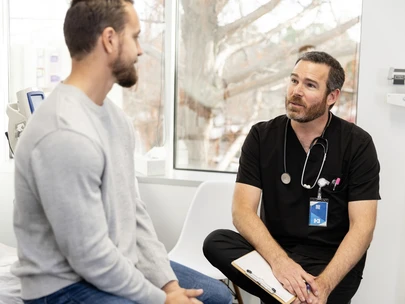For Providers

Iowa Public Health Information
Visit the Iowa Department of Health and Human Services' website to find HIV, STI and viral hepatitis data and epidemiological information, forms for clinicians and laboratories and HIV prevention and care program resources.
Connect to HIV information & resources
-

HIV testing guidance
Find tools and resources about HIV screening for providers, including the benefits of routine screening and how to discuss sexual health during the visit.
-

Preventing new HIV infections
Access information on HIV prevention strategies and tools, including information about pre-exposure prophylaxis (PrEP) and post-exposure prophylaxis (PEP).
-

HIV clinical care
As a clinician, you play a critical role in helping your patients achieve viral suppression! Connect with clinical care resources for HIV.
-

Free health education opportunities
Health education professionals from the Bureau of HIV, STI and Hepatitis at Iowa HHS offer free presentations and trainings throughout the state.